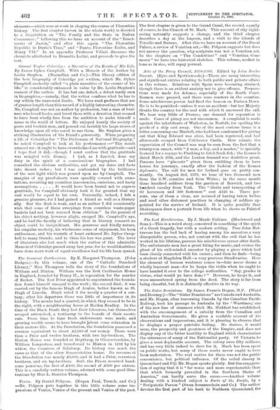Samuel Taylor Coleridge : a Narrative of the Events of
His We. By James Dykes Campbell. With a Memoir of the Author by Leslie Stephen. (Macmillan and Co.)ŌĆöThis library edition of the best biography of Coleridge yet written, which Mr. Dykes Campbell modestly called "a plain narrative of the events of his life," is considerably enhanced in value by Mr. Leslie Stephen's memoir of the author. It has but one defect, a defect rarely seen in biographies,ŌĆönamely, that the writer confines what he has to say within the narrowest limits. We have read prefaces that are of greater length than this record of a highly interesting character. Mr. Campbell was not an author by profession, but a man of busi- ness who loved books, and loved them with a devotion that seemed to have been wholly free from the ambition to make himself a name in the world of letters. He enjoyed keenly the society of poets and bookish men, and poured out lavishly his large stores of knowledge upon all who cared to use them. Mr. Stephen gives a striking illustration of his friend's generosity. When preparing a life of Coleridge for " The Dictionary of National Biography," he asked Campbell to look at his performance :ŌĆö" The result amazed me : it ought to have overwhelmed me with gratitudeŌĆöand I hope that it did,ŌĆöthough I must confess that the gratitude was mingled with dismay. I had, as I fancied, done my duty in the spirit of a conscientious biographer. I had consulted the obvious authorities, and got my dates and facts into decent order ; but I was confounded by the brilliance of the new light which was poured upon me by Campbell. The margins of my proof-sheets were speedily covered with anno- tations, revealing my countless inaccuracies, omissions, and hasty assumptions It would have been brutal not to express gratitude, for Campbell obviously took it for granted that my zeal would be equal to his own. Personally, indeed, I felt a genuine pleasure, for I had gained a friend as well as a literary ally. But the flesh is weak, and as an author I did occasionally wish that some of these sweepings from countless waste-paper baskets had not been rescued from oblivion." In the pursuit of his object nothing, however slight, escaped Mr. Campbell's eye, and he had the faculty of believing that in literary research no object could be insignificant. His generous and kindly nature, his singular modesty, his wholesome sense of enjoyment, his keen enthusiasm, and his warmth of heart endeared Mr. Dykes Camp- bell to many friends, and to them his loss was great. The lover of literature also lost much when the author of this admirable Memoir of Coleridge passed away last year, for he would doubtless have done more work of equal excellence had his life been spared.


















































 Previous page
Previous page